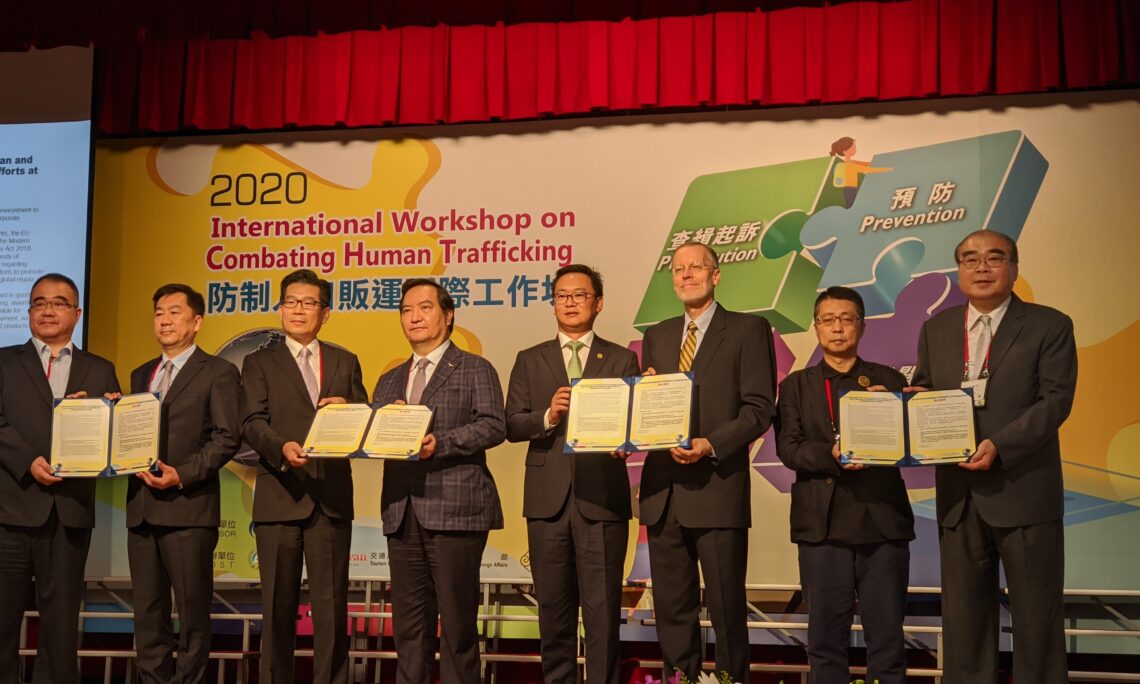OT-2033
September 1, 2020
Remarks by AIT Director W. Brent Christensen at the
2020 International Workshop on Combating Human Trafficking
September 1, 2020
(as prepared for delivery)
Minister Lo, Deputy Minister Chen, Director General Chiu, zǎo ān.
Good morning, and thank you to the National Immigration Agency for convening this event.
Taiwan’s participation, alongside the United States and the broader international community, in the fight against human trafficking is part of our shared value system.
In fact, the presence of so many dedicated non-governmental organizations, rights activists, and media outlets, the agenda’s inclusion of discussions of corporate responsibility and supply chains, and the participation of foreign representatives, including myself, at today’s conference underscore the depth and breadth of our shared political, economic, and international values.
The convening of today’s conference itself is a testament to Taiwan’s success and a model of how free and democratic societies can successfully combat the COVID-19 pandemic.
However, just as no country on the planet is immune from this virus, neither are we immune from human trafficking. Taiwan and the United States are no exceptions.
But for over a decade, Taiwan has been a regional leader in the fight against trafficking, and a true model for what other countries in the region and beyond could accomplish if they had the same tenacity and committed the same financial and human resources, and political will to address this problem.
We were pleased the U.S. Department of State ranked Taiwan Tier 1 for the eleventh consecutive year in the 2020 Trafficking in Persons Report.
In 2019, Taiwan made significant improvements to its anti-trafficking interagency coordination; rolled out new policy initiatives intended to streamline investigations; continued to carry out oversight of vulnerable labor recruitment channels; and increased inspections into potential cases of forced labor within its vast fishing fleet.
Many of these efforts were particularly impressive, considering the challenges inherent in Taiwan’s unique diplomatic status and the significant time and energy required elsewhere in advance of an election year.
However, just as no country is immune from trafficking, all countries – even those demonstrating remarkable efforts to address the crime and protect its victims – can do more.
Again, Taiwan is no exception. In keeping with our long history of close, candid exchanges on this issue, and in the spirit of the productive engagement we have shared over the past year, we hope to touch on a few areas in which Taiwan can further demonstrate its commitment to preventing this heinous crime, making survivors whole, and affirming that there is no place for sex trafficking or forced labor on this island or in the maritime domain where Taiwan also has significant economic interests.
For that, I would like to turn to Ambassador John Cotton Richmond, who leads the State Department’s Office to Monitor and Combat Trafficking in Persons.
Ambassador Richmond is presently the most senior U.S. official dedicated to the fight against trafficking but previously served as a prosecutor with over a decade’s experience in the Justice Department’s human trafficking unit, and co-founded the Human Trafficking Institute, where he co-authored the first U.S. Federal Human Trafficking Report in 2018, which collected and analyzed all active federal trafficking cases in the United States.
His work to combat human trafficking has been recognized with many awards, from both the U.S. government and civil society organizations, and I am incredibly pleased that he was able to join us today, albeit in a virtual format, to share his wealth of experience.
So please join me in welcoming Ambassador Richmond…
















![Video Thumbnail [Recovered]-01](../wp-content/uploads/sites/269/Video-Thumbnail-Recovered-01-1-750x450.jpg)





